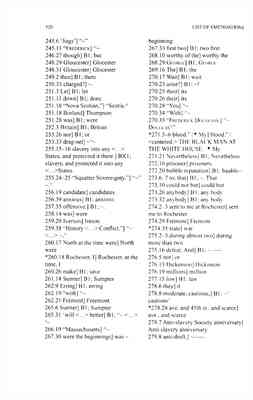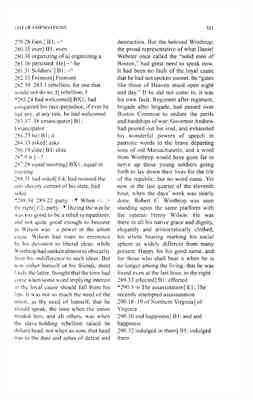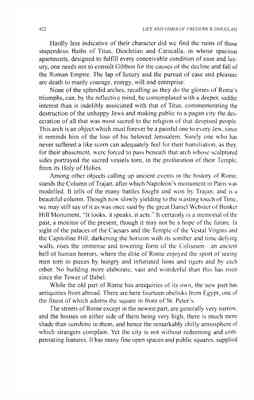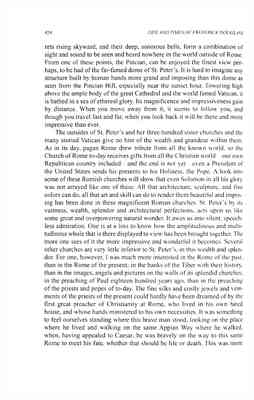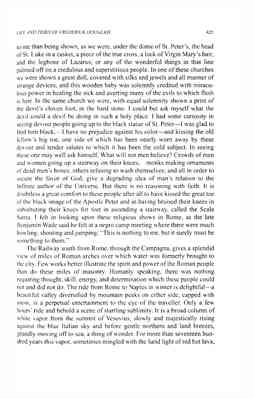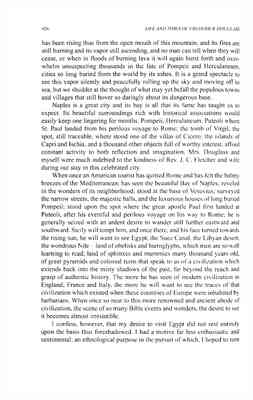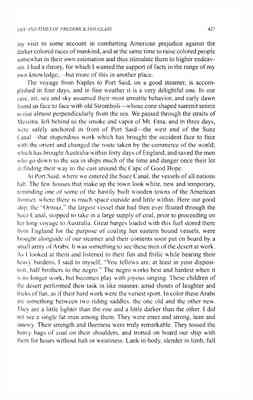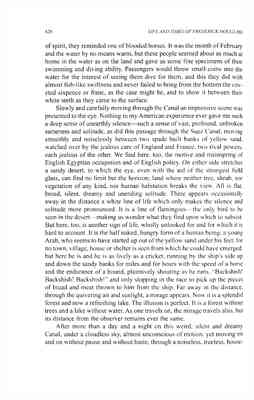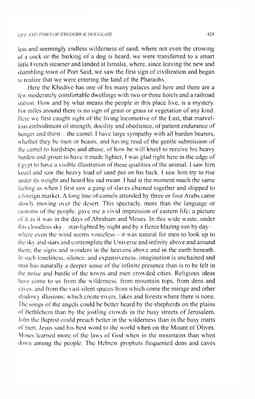Pages That Need Review
Editorial Emendations
8
520
245.6 'bags']"-" 245. J) " FREDERICK] "246.27 though] BI: but 248.29 Gloucester] Glocester 248.31 Gloucester] Glocester 249.2 then] Bl: there 250.33 charged')] -. 251.3 Let] BI: let 251. 11 down] BI : done 251.18 "Nova Scotian,") " Scotia," 251. 18 Borland] Thompson 251.28 was] BI: were 252.3 Britain J BI: Britian 253.26 nor] BI: or 253.33 drag-net]-"255.15-16 slavery into any < . .. > States, and protected it there. J BX I: slavery, and protected it into any < ... > States. 255.24- 25 "Squatter Sovereignty."]"-" I\
256.19 candidate J candidates 256.39 anxious] BI : anxions 257.35 offensive.] BI: -. 258.14 was] were 259.29 Iverson] Ireson 259.38 " History < . . .> Conflict,"] "< > -." 260. 17 North at the time were J North were *260.18 Rochester. I] Rochester. at the time. I 260.26 make] BI: save 261.14 SumterJ BI: Sumpter 262. 9 Erring] B 1: erring 262.19 " with] "262.21 Fremont] Freemon! 265.6 Sumter] BI : Sumpter 265.31 'will < .. .> better] BI: " - < ... > 266.19 "Massachusetts J "267 .30 were the beginnings] was -
LIST OF EMENDATIONS
beginning 267.33 first two] B 1: two first 268.10 worthy of the] worthy the 268.29 Grn1u;1] BI: GrnRCi E 269.16 The] BI: the 270.17 Wait] BI: wait 270.23 arise'1] BI: - 1 270.25 their] its 270.26 their] its 270.28 "You] " 270.34 "With) " 270.35 "FRrntRICK Dm<,L\SS. J " Dou<iLAs"" *271.5- 6 blood." i ~i My] blood." ! <centered: > THE BLACK MAN AT THE WHITE HO USE . ~- \1y 271.21 Ne, ertheless J BI: Ne, etheless 272.16 prisoner) pri soners 272.20 bubble reputation ) BI: bauble-273.6- 7 to: thatj Bl: - That 273.10 could not butj could but 273 .26 anybody] BI : any body 273 .32 anybodyj BI: any body 274 .2-3 sent to me at Rochester] sent me to Rochester 274.29 Fremont] Fremont *274.35 state J war 275 .2- 3 during almost two ] during more than two 275 . 16 defeat. And J BI: -.----276.5 nor] or 276.13 Dickenson J Dickinson 276.19 millions] mill,on 277 . 15 lo w] Bl: law 278.6 they] it 278 .8 moderate. cautious.] HI: - 1 cauti ons 1 *278 .28 ave . and 45th st.. and scarce) ave .. and scarce 279.7 Anti-slavery Society anniversary] Anti-slavery anniversary 279.8 anti-draft.] - --
9
LIST OF EMENDATIONS
521
279.28 Gen.] Bl ;-" 280.35 ever] Bl; even 280.38 organizing of a] organizing a 281. I6 persisted. He] -" he 281.3 I Soldiers'] BI;-" 282.15 Fremont] Fremont 282.39- 283 . 1 rebellion , for one that 11ould not do so. I) rebellion. I *283.24 had welcomed] BX I; had conquered his race-prejudice, if ever he had any: at any rate, he had welcomed 28.1J 7 -38 emancipator) BI: Emancipator 284.23 he J 81: it 2X-IJ3 asked] asks 2X6 .19dite] 81:clite 2x~ \J it] - ? 2X.., _28 equal meeting] BX I: equal in rne.:t i ng 2XXJ I had sided] FA: had resisted the anti-sla\ery current of his state. had mkd *2XX.34 289.22 party. ~ When < . .. > the right J 1:2: party. : •· During the war he 11 as too good to be a rebel sympathizer. and nnt quite good enough to become as \\ilson was- -a power in the union cwse. \\"ilson had risen to eminence hy his derntion to liberal ideas. while \\ mthrnp had sunken almost to obscurity frum his indifference to such ideas. But nuw either himself or his friends. most likely the latter. thought that the time had C\ll11e when some word implying interest 111 the loyal cause should fall from his lips. It 1\as not so much the need of the union. as the need of himself. that he should speak: the time when the union needed him. and all others. was when the sla\e-holding rebellion raised its defiant head. not when as now. that head 11 as in the dust and ashes of defeat and 1
destruction. But the beloved Winthrop, the proud representative of what Daniel Webster once called the "solid men of Boston," had great need to speak now. It had been no fault of the loyal cause that he had not spoken sooner. Its "gates like those of Heaven stood open night and day." If he did not come in, it was his own fault. Regiment after regiment, brigade after brigade, had passed over Boston Common to endure the perils and hardships of war; Governor Andrew had poured out his soul , and exhausted his wonderful powers of speech in patriotic \vords to the brave departing sons of old Massachusetts, and a word from Winthrop would have gone far to nef\ e up those young soldiers going forth to lay down their lives for the life of the republic : but no word came. Yet now in the last quarter of the eleventh hour. when the days' work was nearly done. Robert C. Winthrop was seen standing upon the same platform with the veteran Henry Wilson. He was there in all his native grace and dignity, elegantly and aristocratically clothed, hi s whole bearing marking his social sphere as widely different from many present. Happy for his good name, and for those who shall bear it when he is no longer among the living. that he was found even at the last hour, in the right 289.33 affected] BI: effected *290.5- 6 The assassination] EI: The recently attempted assassination 290.18- 19 of Northern Virginia] of Virginia 290.30 and happiness] BI: and and happiness 290.32 indulged in them] BI: indulged them
Line-End Hyphenation
1
Line-End Hyphenation in the Copy-Texts
At the ends of lines in the copy-texts appear the beginnings of compound words that, following hyphenation, continue in their spellings on the next line. Whether Frederick Douglass intended a hyphenated form of the word or an unhyphenated spelling is not determinable, given not only that the copy-texts do not include a representative sample of such choices in his own hand. Indeed, none of the copy-texts is a holograph, and in this instance there is no reliable way to distinguish between Douglass's preferences and those of his typist(s), editors, and compositors. Ineluctable, though, is the editorial necessity of rendering a decision on a "solid'' or hyphenated spelling, and the editors have elected to do so in the Yale edition by means of adopting the dominant form appearing in the copy-texts of Life and Times.
[left column] 4.7 co-laborers 4.32 self-development 5.18 twenty-three 5.38 slave-breeding 13.5 slave-holding 16.8 Railroad 16.33 steamship 19.20 anti-slavery 23.36 grandmother 24.10 grandchildren 25.20 grand-mamma 32.16 high-handed 32.28 grandmother's 33.18 turkey-houses 34.26 blacksmith 35.39 head-ship 36.1 store-houses 40.4 heart-rending 40.34 overseer 42.28 overpowered 43.3 freeman 43.10 death-bed 46.30 Fault-finding 47.6 painstaking 47.22 overlooked 48.25 health-seeking
[right column] 51.25 handcuffed 52.7 overseer 52.13 overseer 52.22 overseer 52.27 overseer 56.7 forehead 58.32-33 shooting-crackers 61.16 kind-hearted 64.15 slaveholder 67.12 heart-searching 67.13 slaveholder 70.25 slaveholding 71.5 slaveholders 73.8 starboard 73.10-11 starboard 75.9 pathway 78.12 grandmother 79.2 slaveholder 81.11-12 awe-struck 81.26 Slaveholders 83.13 slaveholder 85.19 slaveholder 85.22 hard-heartedness 87.2 Sabbath-school 87.24 class-leaders 90.29 life-long
531
Life and Times, Third Part
48
422 LIFE AND TIMES OF FREDERICK DOUGLASS
Hardly less indicative of their character did we find the ruins of those stupendous Baths of Titus, Diocletian and Caracalla, in whose spacious apartments, designed to fulfill every conceivable condition of ease and luxury, one needs not to consult Gibbon for the causes of the decline and fall of the Roman Empire. The lap of luxury and the pursuit of ease and pleasure are death to manly courage, energy, will and enterprise.
None of the splendid arches, recalling as they do the glories of Rome's triumphs, can, by the reflective mind, be contemplated with a deeper, sadder interest than is indelibly associated with that of Titus, commemorating the destruction of the unhappy Jews and making public to a pagan city the desecration of all that was most sacred to the religion of that despised people. This arch is an object which must forever be a painful one to every Jew, since it reminds him of the loss of his beloved Jerusalem. Surely one who has never suffered a like scorn can adequately feel for their humiliation, as they, for their abasement, were forced to pass beneath that arch whose sculptured sides portrayed the sacred vessels tom, in the profanation of their Temple, from its Holy of Holies.
Among other objects calling up ancient events in the history of Rome, stands the Column of Trajan, after which Napoleon's monument in Paris was modelled. It tells of the many battles fought and won by Trajan, and is a beautiful column. Though now slowly yielding to the wasting touch of Time, we may still say of it as was once said by the great Daniel Webster of Bunker Hill Monument, "It looks, it speaks, it acts." It certainly is a memorial of the past, a monitor of the present, though it may not be a hope of the future. In sight of the palaces of the Caesars and the Temple of the Vestal Virgins and the Capitoline Hill, darkening the horizon with its somber and time defying walls, rises the immense and towering form of the Coliseum – an ancient hell of human horrors, where the elite of Rome enjoyed the sport of seemg men tom to pieces by hungry and infuriated lions and tigers and by each other. No building more elaborate, vast and wonderful than this has risen since the Tower of Babel.
While the old part of Rome has antiquities of its own, the new part has antiquities from abroad. There are here fourteen obelisks from Egypt, one of the finest of which adorns the square in front of St. Peter's.
The streets of Rome except in the newest part, are generally very narrow. and the houses on either side of them being very high, there is much more shade than sunshine in them, and hence the remarkably chilly atmosphere of which strangers complain. Yet the city is not without redeeming and compensating features. It has many fine open spaces and public squares, supplied
50
424 LIFE AND TIMES OF FREDERICK DOUGLASS
rets rising skyward, and their deep, sonorous bells, form a combination of sight and sound to be seen and heard nowhere in the world outside of Rome. From one of these points, the Pincian, can be enjoyed the finest view perhaps, to be had of the far-famed dome of St. Peter's. It is hard to imagine any structure built by human hands more grand and imposing than this dome as seen from the Pincian Hill, especially near the sunset hour. Towering high above the ample body of the great Cathedral and the world famed Vatican, it is bathed in a sea of ethereal glory. Its magnificence and impressiveness gain by distance. When you move away from it, it seems to follow you, and though you travel fast and far, when you look back it will be there and more impressive than ever.
The outsides of St. Peter's and her three hundred sister churches and the many storied Vatican give no hint of the wealth and grandeur within them. As in its day, pagan Rome drew tribute from all the known world, so the Church of Rome to-day receives gifts from all the Christian world-- our own Republican country included~and the end is not yet · even a President of the United States sends his presents to his Holiness. the Pope. A look into some of these Romish churches will show that even Solomon in all his glory was not arrayed like one of these. All that architecture. sculpture. and tine colors can do, all that art and skill can do to render them beautiful and imposing has been done in these magnificent Roman churches. St. Peter's by its vastness, wealth, splendor and architectural perfections. acts upon us like some great and overpowering natural wonder. It awes us into silent, speechless admiration. One is at a loss to know how the amplitudinous and multitudinous whole that is there displayed to view has been brought together. The more one sees of it the more impressive and wonderful it becomes. Several other churches are very little inferior to St. Peter's, in this wealth and splendor. For one, however, I was much more interested in the Rome of the past, than in the Rome of the present; in the banks of the Tiber with their history, than in the images, angels and pictures on the walls of its splendid churches; in the preaching of Paul eighteen hundred years ago, than in the preaching of the priests and popes of to-day. The fine silks and costly jewels and vestments of the priests of the present could hardly have been dreamed of by the first great preacher of Christianity at Rome, who lived in his own hired house, and whose hands ministered to his own necessities . It was something to feel ourselves standing where this brave man stood, looking on the place where he lived and walking on the same Appian Way where he walked, when, having appealed to Caesar, he was bravely on the way to this same Rome to meet his fate, whether that should be life or death. This was more
51
LIFE AND TIMES OF FREDERICK DOUGLASS 425
to me than being shown, as we were, under the dome of St. Peter's, the head of St. Luke in a casket, a piece of the true cross, a lock of Virgin Mary's hair, and the legbone of Lazarus; or any of the wonderful things in that line palmed off on a credulous and superstitious people. In one of these churches we were shown a great doll, covered with silks and jewels and all manner of strange devices, and this wooden baby was solemnly credited with miraculous power in healing the sick and averting many of the evils to which flesh is heir. In the same church we were, with equal solemnity shown a print of the devil's cloven foot, in the hard stone. I could but ask myself what the devil could a devil be doing in such a holy place. I had some curiosity in seeing devout people going up to the black statue of St. Peter-I was glad to find him black. – I have no prejudice against his color – and kissing the old fellow's big toe, one side of which has been nearly worn away by these dernut and tender salutes to which it has been the cold subject. In seeing these one may well ask himself, What will not men believe? Crowds of men and women going up a stairway on their knees;– monks making ornaments of dead men's bones; others refusing to wash themselves; and all in order to secure the favor of God, give a degrading idea of man's relation to the Infinite author of the Universe. But there is no reasoning with faith. It is doubtless a great comfort to these people after all to have kissed the great toe of the black image of the Apostle Peter and in having bruised their knees in substituting their knees for feet in ascending a stairway, called the Scala Santa. I felt in looking upon these religious shows in Rome, as the late Benjamin Wade said he felt at a negro camp meeting where there were much howling, shouting and jumping; "This is nothing to me, but it surely must be something to them."
The Railway south from Rome, through the Campagna, gives a splendid view of miles of Roman arches over which water was formerly brought to the city. Few works better illustrate the spirit and power of the Roman people than do these miles of masonry. Humanly speaking, there was nothing requiring thought, skill, energy. and determination which these people could not and did not do. The ride from Rome to Naples in winter is delightful– a beautiful valley diversified by mountain peaks on either side, capped with snow, is a perpetual entertainment to the eye of the traveller. Only a few hours' ride and behold a scene of startling sublimity. It is a broad column of white vapor from the summit of Vesuvius, slowly and majestically rising against the blue Italian sky and before gentle northern and land breezes, grandly moving off to sea, a thing of wonder. For more than seventeen hundred years this vapor, sometimes mingled with the lurid light of red hot lava,
52
426 LIFE AND TIMES OF FREDERICK DOUGLASS
has been rising thus from the open mouth of this mountain, and its fires are still burning and its vapor still ascending, and no man can tell when they will cease, or when in floods of burning lava it will again burst forth and overwhelm unsuspecting thousands in the fate of Pompeii and Herculaneum, cities so long buried from the world by its ashes. It is a grand spectacle to see this vapor silently and peacefully rolling up the sky and moving off to sea, but we shudder at the thought of what may yet befall the populous towns and villages that still hover so daringly about its dangerous base.
Naples is a great city and its bay is all that its fame has taught us to expect. Its beautiful surroundings rich with historical associations would easily keep one lingering for months. Pompeii, Herculaneum, Puteoli where St. Paul landed from his perilous voyage to Rome; the tomb of Virgil; the spot, still traceable, where stood one of the villas of Cicero; the islands of Capri and lschia, and a thousand other objects full of worthy interest, afford constant activity to both reflection and imagination. Mrs. Douglass and myself were much indebted to the kindness of Rev. J. C. Fletcher and wife during our stay in this celebrated city.
When once an American tourist has quitted Rome and has felt the balmy breezes of the Mediterranean; has seen the beautiful Bay of Naples; reveled in the wonders of its neighborhood; stood at the base of Vesuvius; surveyed the narrow streets, the majestic halls, and the luxurious houses oflong buried Pompeii; stood upon the spot where the great apostle Paul first landed at Puteoli, after his eventful and perilous voyage on his way to Rome; he is generally seized with an ardent desire to wander still further eastward and southward. Sicily will tempt him, and once there, and his face turned towards the rising sun, he will want to see Egypt, the Suez Canal, the Libyan desert, the wondrous Nile– land of obelisks and hieroglyphs, which men are so well learning to read; land of sphinxes and mummies many thousand years old, of great pyramids and colossal ruins that speak to us of a civilization which extends back into the misty shadows of the past, far beyond the reach and grasp of authentic history. The more he has seen of modern civilization in England, France and Italy, the more he will want to see the traces of that civilization which existed when these countries of Europe were inhabited by barbarians. When once so near to this more renowned and ancient abode of civilization, the scene of so many Bible events and wonders, the desire to see it becomes almost irresistible.
I confess, however, that my desire to visit Egypt did not rest entirely upon the basis thus foreshadowed. I had a motive far less enthusiastic and sentimental; an ethnological purpose in the pursuit of which, I hoped to turn
53
LIFE AND TIMES OF FREDERICK DOUGLASS 427
my visit to some account in combatting American prejudice against the darker colored races of mankind, and at the same time to raise colored people somewhat in their own estimation and thus stimulate them to higher endeavors. I had a theory, for which I wanted the support of facts in the range of my own knowledge,– but more of this in another place.
The voyage from Naples to Port Said, on a good steamer, is accomplished in four days, and in fine weather it is a very delightful one. In our case, air, sea and sky assumed their most amiable behavior, and early dawn found us face to face with old Stromboli– whose cone shaped summit seems to rise almost perpendicularly from the sea. We passed through the straits of Messina, left behind us the smoke and vapor of Mt. Etna, and in three days, were safely anchored in front of Port Said– the west end of the Suez Canal– that stupendous work which has brought the occident face to face with the orient and changed the route taken by the commerce of the world; which has brought Australia within forty days of England, and saved the men who go down to the sea in ships much of the time and danger once their lot in finding their way to the east around the Cape of Good Hope.
At Port Said, where we entered the Suez Canal, the vessels of all nations halt. The few houses that make up the town look white, new and temporary, reminding one of some of the hastily built wooden towns of the American frontier, where there is much space outside and little within. Here our good ship, the "Ormuz," the largest vessel that had then ever floated through the Suez Canal, stopped to take in a large supply of coal, prior to proceeding on her long voyage to Australia. Great barges loaded with this fuel stored there from England for the purpose of coaling her eastern bound vessels, were brought alongside of our steamer and their contents soon put on board by a small army of Arabs. It was something to see these men of the desert at work. As I looked at them and listened to their fun and frolic while bearing their heavy burdens, I said to myself, "You fellows are, at least in your disposition, half brothers to the negro." The negro works best and hardest when it is no longer work, but becomes play with joyous singing. These children of the desert performed their task in like manner, amid shouts of laughter and tncks of fun, as if their hard work were the veriest sport. In color these Arabs are something between two riding saddles, the one old and the other new. They arc a little lighter than the one and a little darker than the other. I did not see a single fat man among them. They were erect and strong, lean and sinewy. Their strength and fleetness were truly remarkable. They tossed the heavy bags of coal on their shoulders, and trotted on board our ship with them for hours without halt or weariness. Lank in body, slender in limb, full
54
428 LIFE AND TIMES OF FREDERICK DOUGLASS
of spirit, they reminded one of blooded horses. It was the month of February and the water by no means warm, but these people seemed about as much at home in the water as on the land and gave us some fine specimens of their swimming and diving ability. Passengers would throw small coins into the water for the interest of seeing them dive for them, and this they did with almost fish-like swiftness and never failed to bring from the bottom the coveted sixpence or franc, as the case might be, and to show it between their white teeth as they came to the surface.
Slowly and carefully moving through the Canal an impressive scene was presented to the eye. Nothing in my American experience ever gave me such a deep sense of unearthly silence– such a sense of vast, profound, unbroken sameness and solitude, as did this passage through the Suez Canal, moving smoothly and noiselessly between two spade built banks of yellow sand, watched over by the jealous care of England and France, two rival powers, each jealous of the other. We find here, too, the motive and mainspring of English Egyptian occupation and of English policy. On either side stretches a sandy desert, to which the eye, even with the aid of the strongest field glass, can find no limit but the horizon; land where neither tree, shrub. nor vegetation of any kind, nor human habitation breaks the view. All is flat, broad, silent, dreamy and unending solitude. There appears occasionally away in the distance a white line of life which only makes the silence and solitude more pronounced. It is a line of flamingoes– the only bird to be seen in the desert– making us wonder what they find upon which to subsist. But here, too, is another sign of life, wholly unlooked for and for which it is hard to account. It is the half naked, hungry form of a human being, a young Arab, who seems to have started up out of the yellow sand under his feet, for no town, village, house or shelter is seen from which he could have emerged; but here he is and he is as lively as a cricket, running by the ship's side up and down the sandy banks for miles and for hours with the speed of a horse and the endurance of a hound, plaintively shouting as he runs, "Backshish! Backshish! Backshish!" and only stopping in the race to pick up the pieces of bread and meat thrown to him from the ship. Far away in the distance, through the quivering air and sunlight, a mirage appears. Now it is a splendid forest and now a refreshing lake. The illusion is perfect. It is a forest without trees and a lake without water. As one travels on, the mirage travels also, but its distance from the observer remains ever the same.
After more than a day and a night on this weird. silent and dreamy Canal, under a cloudless sky, almost unconscious of motion, yet moving on and on without pause and without haste, through a noiseless, treeless, house-
55
THE LIFE AND TIMES OF FREDERICK DOUGLASS 429
less and seemingly endless wilderness of sand, where not even the crowing of a cock or the barking of a dog is heard, we were transferred to a smart little French steamer and landed at lsmalia, where, since leaving the new and shambling town of Port Said, we saw the first sign of civilization and began to realize that we were entering the land of the Pharaohs.
Here the Khedive has one of his many palaces and here and there are a few moderately comfortable dwellings with two or three hotels and a railroad station. How and by what means the people in this place live, is a mystery. For miles around there is no sign of grain or grass or vegetation of any kind. Here we first caught sight of the living locomotive of the East, that marvellous embodiment of strength, docility and obedience, of patient endurance of hunger and thirst– the camel. I have large sympathy with all burden bearers, whether they be men or beasts, and having read of the gentle submission of the camel to hardships and abuse, of how he will kneel to receive his heavy hurden and groan to have it made lighter, I was glad right here in the edge of Egypt to have a visible illustration of these qualities of the animal. I saw him kneel and saw the heavy load of sand put on his back. I saw him try to rise under its weight and heard his sad moan. I had at the moment much the same feeling as when I first saw a gang of slaves chained together and shipped to a foreign market. A long line of camels attended by three or four Arabs came slowly moving over the desert. This spectacle, more than the language or customs of the people, gave me a vivid impression of eastern life; a picture of it as it was in the days of Abraham and Moses. In this wide waste, under this cloudless sky star-lighted by night and by a fierce blazing sun by day– where even the wind seems voiceless– it was natural for men to look up to the sky and stars and contemplate the Universe and infinity above and around them; the signs and wonders in the heavens above and in the earth beneath. In such loneliness, silence, and expansiveness, imagination is unchained and man has naturally a deeper sense of the infinite presence than is to be felt in the noise and hustle of the towns and men crowded cities. Religious ideas have come to us from the wilderness, from mountain tops, from dens and caves, and from the last silent spaces from which come the mirage and other shadowy illusions; which create rivers, lakes and forests where there is none. The songs of the angels could he better heard by the shepherds on the plains of Bethlehem than by the jostling crowds in the busy streets of Jerusalem. John the Baptist could preach better in the wilderness than in the busy marts of men. Jesus said his best word to the world when on the Mount of Olives. Moses learned more of the laws of God when in the mountains than when down among the people. The Hebrew prophets frequented dens and caves
